
Date: Thursday, May 20
Each year, the global accessibility community unites on the third Thursday of May for Global Accessibility Awareness Day (GAAD) to highlight the need for more inclusive digital content. We seek to join the conversation by inspiring and motivating institutions across the globe to demonstrate how accessible content is better content.
For more details, visit the event web page.
The post Join us for the fix your content challenge appeared first on Provost Communiqué.
This post originally published on Provost Communiqué.




